UTFORSK
Teaching Gender Equality and Diversity in Norway and Japan (UTFORSK)

About the project
Teaching Gender Equality and Diversity in Norway and Japan (UTFORSK; 2021-2025) is a four-year teaching and research collaboration between between the Center for Gender Research (CGR) at the Department of Interdisciplinary Studies of Culture at NTNU (Trondheim, Norway) and the Institute for Gender Studies (IGS) at Ochanomizu University (Tokyo, Japan) in the fields of gender equality and diversity.
UTFORSK’s primary purpose is to develop new pedagogical strategies to strengthen the quality of gender studies education at both the Center for Gender Research at NTNU and our partner institution the Institutes for Gender Studies and Global Leadership at Ochanomizu University (Japan). The project builds on a pre-existing strategic collaboration between the two institutions made possible by an ongoing INTPART project named NJ_BREGED (RCN, 2019-2022), and current research on transformative learning in Gender Studies (NTNU, 2019-).
Through international exchange and collaboration, joint curricular activities, the promotion of young researchers’ work and the development of disciplinary-specific teaching practices, the project will provide students and staff with a quality-enhanced and stimulating international learning environment at all levels. In doing so, UTFORSK seeks to establish a clear focus on the role of transformative teaching and learning in the education of students and young researchers.
The project is funded by the Norwegian Agency for International Cooperation and Quality Enhancement in Higher Education (DIKU).
Activities and Results
27 & 29 May 2024 Joint Seminar with Gunma University
27 & 29 May 2024 Joint Seminar with Gunma University
Master’s thesis Intolerance to diversity: LGBTQIA+ narratives of navigating the Japanese school system by Emilie Helén Vik.
Master’s thesis Intolerance to diversity: LGBTQIA+ narratives of navigating the Japanese school system by Emilie Helén Vik.
Emilie was the recipient of an UTFORSK mobility grant which abled her to study and conduct research for three months in Tokyo. Her thesis discusses the experiences of LGBTQIA+ students and allies with heteronormativity, sex education and gender expression in the Japanese school system.
COIL course ‘Gender (in)equality in the home’, October 2023
COIL course ‘Gender (in)equality in the home’, October 2023
This fall, the UTFORSK team was able to test their COIL course ‘gender (in)equality in the home’ in Japan and Norway among first year Master’s students in the Gender Equality and Diversity Master’s program at NTNU. Twenty students participated in the course which concluded with a student research forum. A truly international endeavor with students from Japan, China, Finland, the US, Turkey and Norway made this a very rewarding experience!
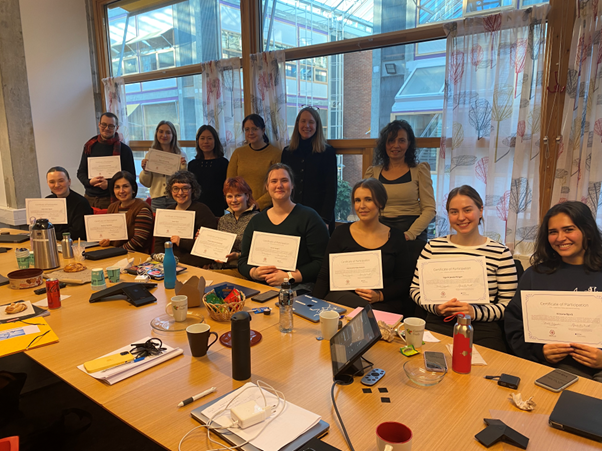
June 19-20, 2023 COIL cohort meeting in Bergen, Norway
June 19-20, 2023 COIL cohort meeting in Bergen, Norway
The COIL team travelled to Bergen where they joined other grant recipient teams from other higher education institutions in South Korea, Japan and the United States for a two-day intensive seminar where they gained inspiration from one another and received feedback on their COIL course.
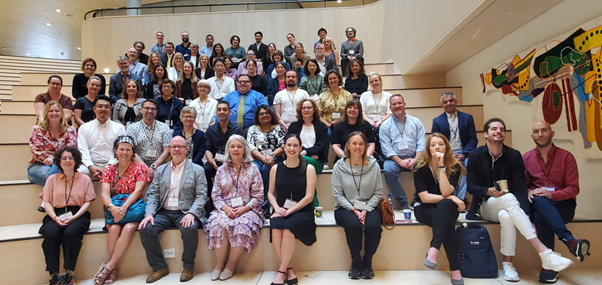
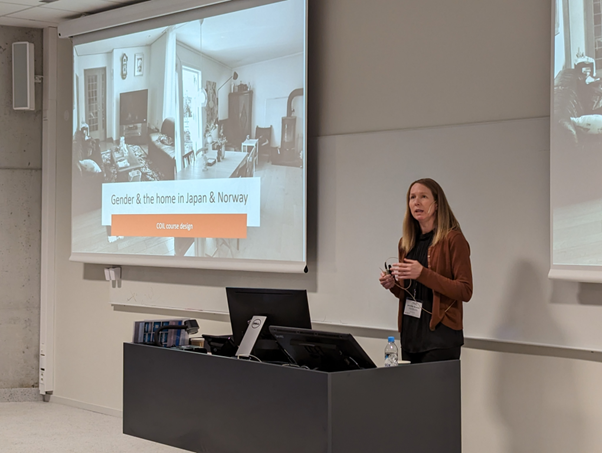
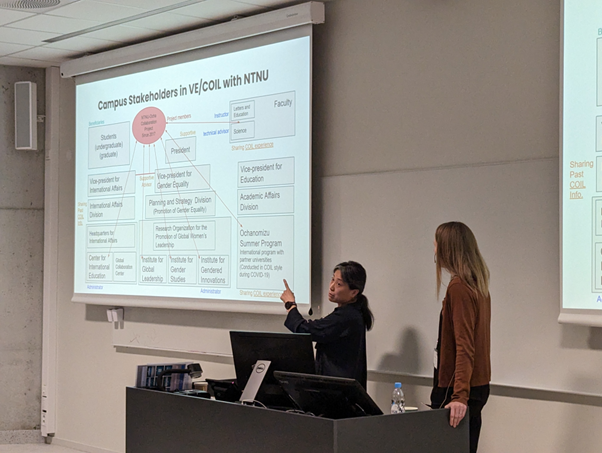
UTFORSK visit to DNV in Kobe, Japan - 22 April 2023
UTFORSK visit to DNV in Kobe, Japan - 22 April 2023
Project team visits with business leader Stian Sollied at DNV in Kobe to discuss what opportunities gender equality and diversity represent for the company’s international work environment.
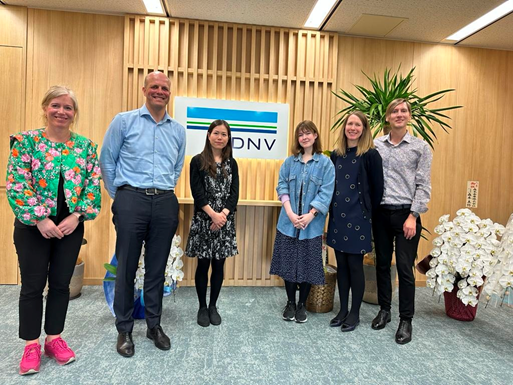
Visit of Nara Women’s University STEAM lab & research presentation session
Visit of Nara Women’s University STEAM lab & research presentation session
The project group visited the new STEAM design laboratory at Nara Women’s University to discuss strategies to increase women’s participation in traditional STEM fields.

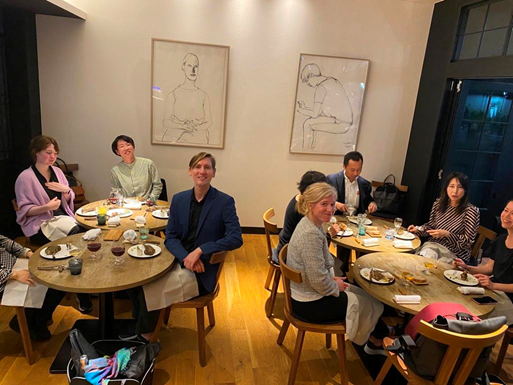
First UTFORSK seminar - April 24 2023
First UTFORSK seminar - April 24 2023
On 24 April, 2023 Ochanomizu University hosted the first UTFORSK teaching and research seminar. The seminar’s agenda included a young researcher forum with research presentations by M.A. and PhD students from both universities and collaborative work on the future collaborative learning opportunities.

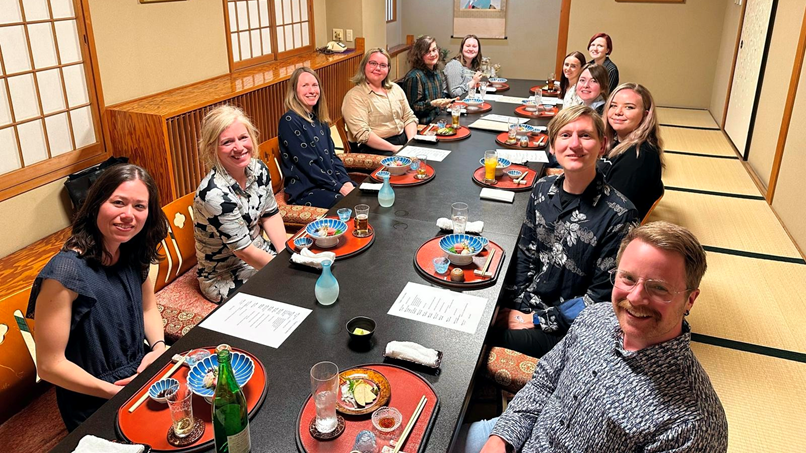
UTFORSK project awarded capacity building grant to develop collaborative online international learning (COIL), March 2023
UTFORSK project awarded capacity building grant to develop collaborative online international learning (COIL), March 2023
As part of the UTFORSK project, the Center for Gender Research at NTNU and Ochanomizu Unviersity received a capacity-building grant to develop collaborative online international learning (COIL) as a key feature of the education collaboration. From March-June, Jennifer Branlat, Priscilla Ringrose and Leika Aruga from NTNU along with Akiko Hagiwara, Kumi Yoshihara, and Makoto Kobayashi from Ochanomizu took part in the institute’s intensive training course.
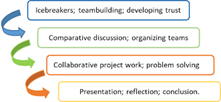
Prof. Branlat joins JSPS board – Aug 2022
Prof. Branlat joins JSPS board – Aug 2022
We are pleased to announce that Prof. Jennifer Branlat has joined the board of Alumni Club in Norway (ACN) for Japan Society for the Promotion of Science (JSPS). The JSPS Alumni Club in Norway (ACN) was established in 2019 by the initiative of former JSPS fellows, and the club has 89 members. The ACN organizes symposia on various themes, Norway-Japan Academic Network, the annual General Assembly and Board Meetings. It also works in close collaboration with Innovation Norway in Japan, The Norwegian Embassy in Japan, HK-Dir and Research Council in Norway on a webinar series.
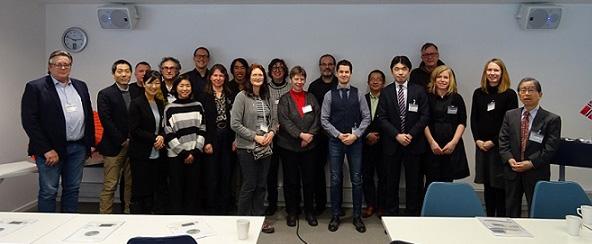
Asianet Conference – June 2022
Asianet Conference – June 2022
The Asianet Conference took place at NTNU on 16-17 June 2022. Prof. Priscilla Ringrose and Prof. Jennifer Branlat participated in Asianet Conference with their paper, 'Same but different? Transnational research and educational collaboration in
gender equality and diversity education'. The conference's theme was 'Asia and Fragmented Globalisations'.
In their paper, Prof. Ringrose and Prof. Branlat reflected on the two ongoing projects NTNU's Centre for Gender Research has with Ochanomizu University, namely UTFORSK and INTPART. They discussed their experiences thus far with building research on gender equality and diversity education from a cross-national comparative perspective between Norway and Japan. They share what factors have presented challenges, and what strategies have proven successful. Webpage with further information.

Panorama Seminar – June 2022
Panorama Seminar – June 2022
Organized by the Directorate for Higher Education and Skills / Direktoratet for høyere utdanning og kompetanse; held at Høgskolen på Vestlandet (HVL) on 14-15 June 2022.
The Panorama Seminar aimed to address the opportunities and challenges associated with academic cooperation with Brazil, Canada, China, India, Japan, Russia, South Africa, South Korea and the USA.
In activities with Panorama countries, research collaboration has traditionally been more extensive than education collaborations. Indeed, the underlying rational for the Panorama Strategy has been that education collaboration and student involvement can be connected to existing research collaboration, leading to a “students follow researchers” approach. This session asked: How can established research collaborations and networks be used to develop education collaboration? What are the important factors for the success of such an endeavor?
In the session “From Research to Education Cooperation,” Prof. Jennifer Branlat spoke on behalf of the UTFORSK project team to discuss the development of UTFORSK. She shared theexperience of the Center for Gender Research in building an education collaboration from an existing research collaboration with Ochanomizu University in Tokyo.
Digital Seminar with NTNU and Ochanomizu students – June 2022
Digital Seminar with NTNU and Ochanomizu students – June 2022
NTNU and Ochanomizu students came together in a digital seminar to present on a topic of choice, namely 'reproduction and family life' in each context. The seminar was a great start to the UTFORSK collaboration!
NTNU students focussed mainly parental benefits unique to the Nordic welfare system, falling fertility rates in Norway, and the ways in which they are framed as a ‘problem’ by conservative politicians. They addressed the political question of whether families should have more children to keep the welfare state going or fewer children to reduce the environmental consequences. They also discussed egg donation, which is a relatively recent phenomenon in Norway, and the state's promises to make ARTs more gender equal.
The Ochanomizu students discussed 'anonymous births' in Japan. Being able to give birth anonymously in Japan is controversial and considered to be a solution to helping young (sometimes underage) mothers give birth without their families knowing. Normally, such mothers want to give their children up for adoption. If there are no measures in place, young women may either harm the baby, themselves or both, as they try to find a solution themselves. With input from the NTNU students, they also discussed why there is not an equivalent framework in Norway.
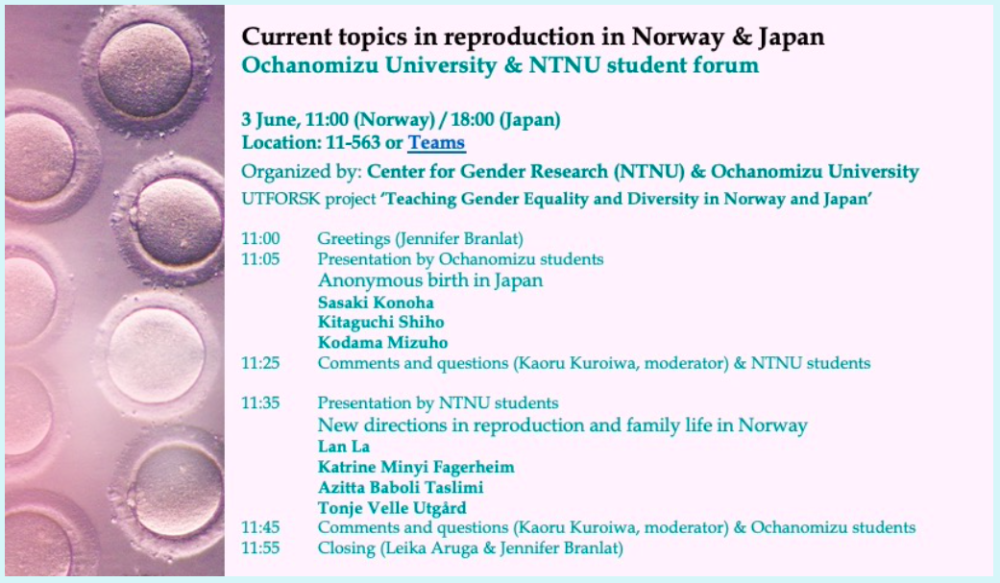
For further reading on 'anonymous births' in Japan, here are two English news articles on the topic:
Project participants
Masako Ishii-Kuntz Trustee and Vice President, Ochanomizu University
Makoto Kobayashi Director of the Institute for Global Leadership, Ochanomizu University
Priscilla Ringrose Professor, NTNU
Siri Ø. Sørensen Professor and Head of Center for Gender Research, NTNU
Derek Matsuda Lecturer, Ochanomizu University
Rie Okamura Project Lecturer, the Institute for Global Leadership, Ochanomizu University
Guro K. Kristensen Professor and Head of Department, NTNU
Kumi Yoshihara Project Research Fellow, Ochanomizu University
Lotte Sæther Student Advisor, NTNU
Student Resources for Studies in Japan
Click on the title above to access a collection of resources on Japan living, culture, social issues, and practical advice.
Materials included are books, articles, videos/ series/ films, Japanese language resources, blogs, podcasts, and travel guides.
Other partners
